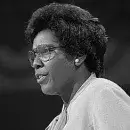
Barbara Jordan
Barbara Jordan was the first African American elected to the Texas Senate after Reconstruction, the first Southern African American woman elected to the U.S. House of Representatives, and one of the first two African Americans elected to the U.S. House from the former Confederacy since 1901. In 1974, Jordan’s gave the opening statement as a member of the House Judiciary Committee supporting the impeachment of President Richard Nixon, and delivered the keynote address at the 1976 Democratic National Convention.
Educated at Texas Southern University (B.A., 1956) and Boston University Law School (LL.B., 1959), she briefly taught political science at Tuskegee Institute and then launched a private legal practice in Houston. She won a seat in the Texas Senate in 1966. She was the first African American woman to serve as president pro tempore of the state senate and served one day–June 10, 1972–as acting governor of Texas. During her time in the Texas legislature, Jordan sponsored or cosponsored some seventy bills. She served in the U.S. House of Representatives from 1973 to 1979, during which time she sponsored or cosponsored over three hundred bills or resolutions. Her work on the House Judiciary Committee in 1975 was instrumental in renewing the Voting Rights Act.
She published Barbara Jordan, a Self-Portrait in 1979, and taught at the Lyndon B. Johnson School of Public Affairs at the University of Texas, Austin. In 1981, she joined Norman Lear to cofound People for the American Way, which campaigns for freedom of expression, civic engagement, fair courts, and legal and lived equality for LGBTQ people. In the 1990s, she served as an adviser on ethics for Texas Governor Ann Richards. From 1994 until her death, Jordan chaired the U.S. Commission on Immigration Reform. The U.S. National Archives has referred to Jordan as the first LGBTQ+ woman in the U.S. Congress, despite never publicly identifying as lesbian or queer.